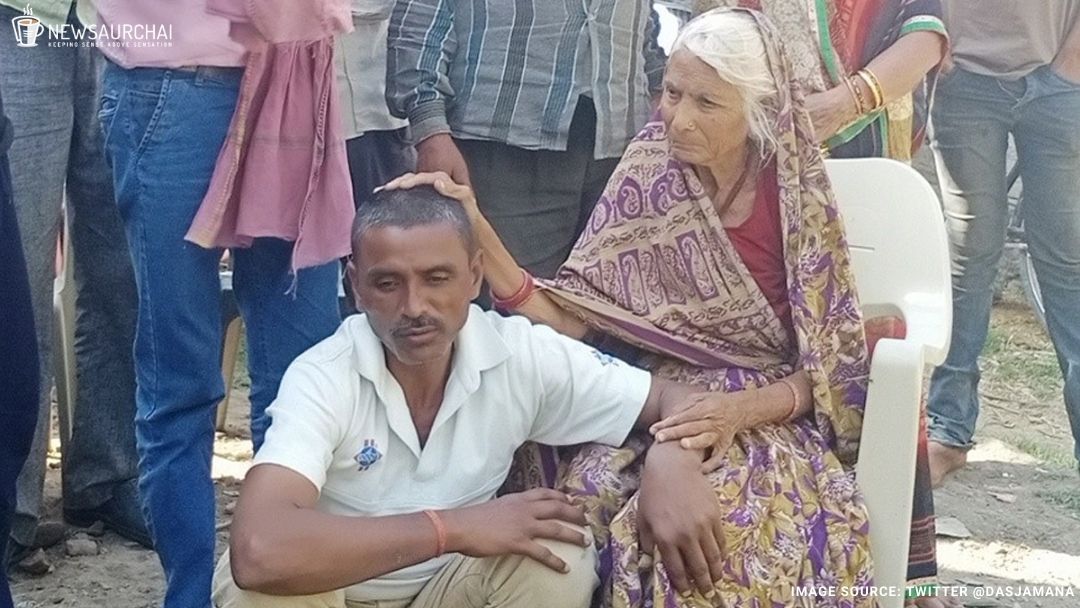
After 20 years of imprisonment, a court has acquitted a man for a crime he never committed. Accused of rape and sexual assault, Vishnu Tiwari was sentenced to 10 years of imprisonment following a conviction under Sections of the Indian Penal Code (IPC) and the Scheduled Caste and Scheduled Tribe (Prevention of Atrocities) Act, 1989 (SC/ST Act)
Vishu Tiwari Spends 20 Years In Jail
Vishnu Tiwari spent 20 years in prison before he was finally pronounced innocent by the Allahabad High Court in January this year. Hailing from a village located in the Lalitpur District of Uttar Pradesh, Tiwari was accused of rape and sexual assault by a woman from his village in September 2000.
At the time, Tiwari was only 23-years old and was arrested based on a First Information Report (FIR) filed by the woman’s husband and her father-in-law. He was subsequently charged for rape and atrocities under Sections of the IPC and the SC/ST Act. Tiwari secured bail but was arrested again in 2001.
In 2003, following two years spent under trial, a Lalitpur court sentenced him to 10 years of rigorous imprisonment. Following his conviction under the SC/ST Act, Tiwari was sentenced to 20 years of life imprisonment. All sentences were to run concurrently, as per the directions of the trial court. After spending three years at the Lalitpur Jail, Tiwari was shifted to the Agra Central Jail, where he served his sentence until his release. In 2005, Tiwari challenged his conviction by a trial court, but his petition was considered defective, claiming that all the required documents were not in place.
For 16 years, the situation remained the same as Tiwari did not have the financial means to hire a better lawyer to appeal in the higher court after his conviction by the Lalitpur court, as per reports. Tiwari says that he had to sell his ancestral land to pay the lawyers. He claimed that he lost the will to fight the battle further. The family’s economic situation worsened over the years. He lost both of his parents and two brothers during his time in prison. He could not attend any of their funerals and only has a younger brother back at his village home.
Now 43, Tiwari has no expectations from life. He says that he has no education, no skill set and hardly any family around. Tiwari adds that he cannot even marry and that his only surviving brother is a monk. He says that he is devastated from the inside, and so is his family. The jail administration gave Tiwari Rs. 600/- before as he was leaving.
Speaking to reporters, his nephew, Satyendra, said that his uncle’s false conviction ruined the family, socially and financially. He attributed the deaths within his immediate family to shock and social stigma arising out of the conviction. He added that his uncle’s entire life had been shattered as he spent his best years of life behind bars.
Events That Followed After Conviction
Tiwari’s conviction and the events that followed highlight the miserable state of judicial affairs in Uttar Pradesh. While acquitting him, the Divisional Bench of the High Court observed that the state should have considered reducing his sentence as he remained in prison for an extended period pending appeal. The Court referred to Sections of the Criminal Procedure Code (CrPC), raising a solid objection towards the state and the centre for not exercising its “duty to commute the sentences as mentioned…even after 14 years of incarceration.” The Court also noted that medical evidence showed no semblance of forcible intercourse and, citing the evidence, stated that the doctor did not find any sperm and categorically opined against any sign of forcible sexual intercourse. It observed that “We find one more fact that despite allegation that rape is committed as alleged by the prosecutrix, there are no injuries on the private part of the lady, who is a fully grown-up lady and who was pregnant and is said to have been thrashed”.
It further maintained that factual data pointed out several contradictions in all three witnesses’ cross-examinations and were, hence, convinced that the accused had been wrongly convicted, subsequently reversing the order and judgment impugned and acquitting the accused. On his part, Tiwari held that the case was the result of a land dispute. He says that he had never spoken to the woman, and they sought to get money through the Harijan Act.
What Media Reports Showed
False reporting of rape has long been used as a weapon to avenge past disputes or rivalries or simply as a measure to hide one’s conspiracy, be it related to caste, class, religion, or personal vendetta in relationships. Recent cases, including the false accusation of rape against a Health Inspector in Kerala by a “victim” and a made-up gang-rape story by a 14-year old girl from the Kawardha district Chhattisgarh, underline this issue.
Studies have concluded that false accusations and implications cast aspersions on the accused and are detrimental to their social status. A 2014 report by the Delhi Commission of Women found that 53.2% of rape cases filed between April 2013-July 2014 were false – all the cases dismissed as ‘False’ did not make it to trial.
The media, too, has been complicit in peppering narratives surrounding rape cases. It plays a significant role in shaping perceptions about the victim and the accused. The vocabulary used and the information published carve an opinion about the events that precede the incident and its background.
Despite several laws to protect victims of rape and other forms of gender-based violence, the onus of deterring perpetrators from committing gender-based atrocities, providing justice to the victims and encouraging legal recourse for the falsely accused should fall not only on the courts of the land but also the state, the media and the people as a whole.





